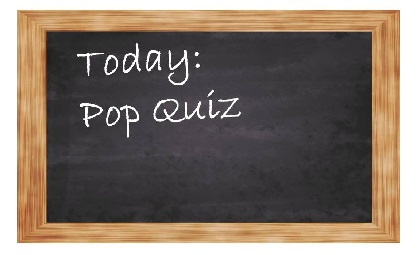Survival Vocab Quiz
 OK, so you’re in good shape when it comes to preparedness.
OK, so you’re in good shape when it comes to preparedness.
But can you talk to people about preparedness using THEIR words?
Here are three quick quizzes for three different groups. See how you do!
Group One: Your Prepper Relatives
While you may not be a red-hot survivalist, you probably have a few in the family. Maintain your dignity by knowing these prepper acronyms:
- EDC – Every day carry – collection of essential, small items that the survivalist has at all times in a pocket or purse.
- ATV – All-terrain-vehicle – A three or four-wheeled “buggy” that can carry preppers to safety through the woods or over the hills, when roads are impassible or too dangerous.
- BOB – Bug-Out-Bag – What you need to have ready to grab and go and that will keep you alive for at least 72 hours. At a minimum it contains shelter, water, and food.
- OTG – Off the grid – Surviving without access to electricity, municipal water, grocery stores, etc. Usually, it means setting up alternative living arrangements in an isolated area where you won’t be bothered by people who haven’t prepared in advance.
- SHTF – Shit Hits The Fan – All your preparations are made so that you will survive when the SHTF.
Group Two: Your Emergency Response Team Volunteers
These folks are committed and concerned. You owe it to them to provide good leadership by knowing what you’re taking about.
- CERT – Community Emergency Response Team member – Someone who has taken the (free) 24 hour course designed by FEMA (see DHS, below), offered by a city or other local organization. CERT members are volunteers who have received training in basic disaster response skills and who agree to provide emergency care until professionals arrive, and then support those professionals as needed.
- DHS – Department of Homeland Security – DHS was established in 2002, combining 22 different federal departments and agencies into one cabinet-level agency that now has 240,000 employees. FEMA, the Federal Emergency Management Agency, is part of DHS.
- EMT – Emergency Medical Technicians — EMTs are trained to provide emergency medical care before a person arrives at a hospital. EMTs may be associated with an ambulance company or a fire department; they may have different levels of training depending on their state or employer.
- SOP – Standard Operating Procedure – “The way we do things.” If you don’t have an SOP for your team, then you can’t expect any given outcome.
- Triage — Triage is the first step in an emergency. It is the process for sorting injured people into groups based on their need for medical treatment. Triage, by definition means that as a volunteer you don’t stop to help the first injured person you see.
Group Three: Co-workers
People at work deserve a plan for emergencies. If you’re involved, here are formal and informal terms you should be using:
- OSHA – Occupational Safety and Health Administration – OSHA is part of the Department of Labor. For our purposes, it is important to realize that OSHA’s purpose is to “provide a workplace free from serious recognized hazards.” Generally, this does NOT require any sort of emergency preparedness plan.
- BC/DR Plan – Business Continuity/Disaster Recovery Plan — These terms are often used interchangeably but they both contain an approach to (1) preparing for emergencies, (2) taking action to limit damage before anything happens, (3) understanding how to get through the disaster when it does it, and then, (4) how to get back to BAU (see below).
- BIA – Business Impact Analysis – This is the first step to a Disaster Recovery plan. It’s a process that will identify and evaluate the potential effects of a disaster, accident or emergency on your critical business operations. The BIA will help set priorities for your planning.
- BAU – Business As Usual — After an emergency, BAU is what you want to get to. However, it’s possible that today in your workplace, if changes aren’t made right away, your current BAU will lead to a worse disaster than was necessary!
- SOW – Statement of Work — If your organization decides to hire a consultant to help in developing your BC or DR Plan, you’ll likely ask for, or actually provide yourself as part of the consulting contract, a statement of work that outlines exactly what is to be done.
Ok, had enough?! Here are a couple of suggestions to make this exercise valuable for a bigger audience.
- Action Item #1: Consider printing out these definitions for your emergency response team members. Go over them out loud at a training meeting so everyone knows how they sound and can say them easily. Some of this will be new to some of your members, I can guarantee it!
- Action Item #2: At work, share this list with co-workers or with your boss. If emergency preparedness and emergency planning are relatively new subjects, people will get a sense of confidence having been exposed to this vocab.
Let us know how you used the list!
Virginia
Your Emergency Plan Guide Team
P.S. And one last acronym I just can’t resist putting in here: TEOTWAWKI:
If you’ve spent time on survival websites, you’ll know that this stands for The End Of The World As We Know It. TEOTWAWKI usually assumes a BIG disaster – total economic collapse, cosmic event, pandemic, etc. I don’t know how the acronym is pronounced, if it even can be pronounced!
P.P.S. More preparedness vocabulary for people who like this sort of thing:
- Some of the basic words from our CERT classes: https://emergencyplanguide.org/emergency-preparedness-vocabulary/
- More words typically used in a business setting: https://emergencyplanguide.org/emergency-preparedness-vocabulary-for-business/
- Jargon that I picked up from our Police and Fire Department trainers: https://emergencyplanguide.org/jargon-more-vocab-from-the-world-of-emergency-preparedness/
